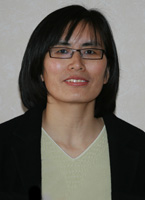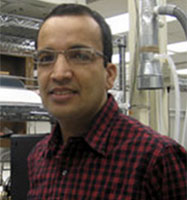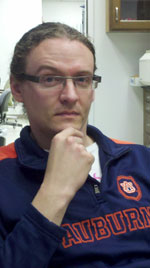

Venue: UAB Alumni House
Registration: Registration is closed.
What is the metabolome? Besides metabolites made by mammalian cells, there are many other small molecules that come from the food we eat and drugs we take, as well as those produced by microorganisms occupying the gastrointestinal tract. We are also exposed to environmental small molecules in the water we drink and air we breathe. All of these comprise the metabolome and the integration of metabolomes over a period of time is the exposome.
Metabolites are not simply sources of energy to drive enzymatic reactions, but are also the building blocks of the small molecule regulators, e.g., steroid hormones, and all the macromolecules in a cell (including DNA, RNA, proteins, lipids and complex carbohydrates). They are also regulators of gene and protein methylation/demethylation processes.
This free, one-day workshop, sponsored by the UAB Center for Clinical and Translational Sciences, will provide initial training in metabolomics for biomedical investigators. Training will be given in the design of a metabolomics experiment, the need for extraction, the analytical platforms, data pre-processing and statistical analysis, metabolite identification and pathway analysis and application of metabolomics to a complex system.
NIH Common Fund Program - http://commonfund.nih.gov/metabolomics/index
Metabolomics Workbench - http://www.metabolomicsworkbench.org/nihmetabolomics/
| Time | Topics & Speakers | Resources |
| 7:45-8:30 | Breakfast | |
| 8:30-8:35 | Introductions Dr. Richard Marchase, UAB Vice-President for Research and Economic Development |
|
| 8:35-8:55 | Introduction to Metabolomics History and Relationship to other –Omics, and Challenges in Metabolomics Steve Barnes |
 (7.4Mb) Video |
| 9:00-9:25 | Designing a metabolomics experiment Epidemiological, clinical, animal models, and cells Xiangqin Cui |
 (695Kb) |
| 9:30-9:55 | Sample types, storage and extraction for metabolomics Steve Barnes |
 (10.1Mb) |
| 10:00-10:20 | Metabolomics platforms Steve Barnes, Ramu Krishna |
 (3.4Mb) Video |
| 10:20-10:40 | Coffee | |
| 10:40-11:00 | Processing of MS metabolomics data Landon Wilson (XCMS) |
 (3.1Mb) Video |
| 11:05-11:30 | Processing of NMR metabolomics data Rama Krishna |
 (7.4Mb) Video |
| 11:35-12:00 | Creating files for MetaboAnalyst Steve Barnes |
 (2.5Mb) |
| 12:00 noon | Lunch |
|
| 12:30-12:55 | Imaging metabolomics Janusz Kabarowski |
 (8.3Mb) |
| 1:00-1:30 | Applying MetaboAnalyst Xiangqin Cui |
 (2.4Mb) |
| 1:30-2:00 | Concept and application of Mummichog for pathway analysis Steve Barnes |
 (556Kb) |
| 2:00-2:25 | METLIN and interpretation of MSMS spectra Jeevan Prasain |
 (2.0Mb) |
| 2:30-3:00 | Funding and other resources for metabolomics Workshop faculty |
 (259Kb) |

Dr. Barnes, Director of the Metabolomics Workshop, is Professor of Pharmacology and Toxicology and has secondary appointments in five other departments. He started his research career in the laboratory of A. T. (Tony) James, co-inventor of gas-liquid chromatography, studying fatty metabolism in green algae and did his PhD on the carbohydrate metabolism of the acellular slime mold Physarum polycephalum at Imperial College, University of London under the tutelage of Sir Ernst Boris Chain, 1945 Nobel Laureate for the discovery of penicillin. He began his long-standing interest in bile acid metabolism at the Royal Free Hospital with Dame Sheila Sherlock and Barbara Billing. After the winter of 1975 in Alan Hofmann’s lab at the Mayo Clinic in Rochester, he took up an offer to come to the University of Alabama at Birmingham (UAB) in 1977 where he has remained ever since. In the early 1980s he applied high field NMR using superconducting magnets to unravel the proton NMR spectrum of bile acids as well as to use pulse sequences to greatly simplify the process. In 1992 he took over the development of LC-mass spectrometry in biomedical research at UAB and was the Director of the UAB Comprehensive Cancer Center Mass Spectrometry Shared Facility from 1992 to 2009. In 2009 he was appointed as the Director of the Targeted Metabolomics and Proteomics Laboratory (TMPL). He also was the Associate Director of the Purdue-UAB Botanicals Center for Age-related Disease from 2000-2011 and the Director of the UAB Center for Nutrient-Gene Interaction from 2002-2010. These latter roles provided critical experience in experimental design, statistical analysis of –Omics data and the important role of the diet in determining the outcome of experimental models of chronic diseases.
More details about TMPL can be obtained at http://tmpl.uab.edu

Dr. Cui received her Ph.D in Genetics at Iowa State University in 2001. She then took her 3-year postdoctoral training in statistical genetics at the Jackson Laboratory. Dr. Cui joined SSG in Aug 2004 as an Assistant Professor with a joint appointment in the Biostatistics Department and the Department of Medicine (Division of Genetic and Translational Medicine). Her research interest includes statistical genetics/genomics, epigenomics, and high throughput experimental design and data analyses.
http://www.soph.uab.edu/ssg/people/cui

Janusz Kabarowski, PhD, Associate Professor of Microbiology. Dr. Kabarowski obtained his PhD in the field of hematopoiesis and leukemia at University College, London and did his postdoctoral training in immunology with Dr. Owen Witte at UCLA. His expertise is in the study of lipids in inflammation and immunity. He has applied this expertise to studies of lipid mediated mechanisms controlling inflammation and autoimmunity using mouse models of atherosclerosis, Lupus and tissue/organ injury. He is currently investigating approaches by which potential anti-inflammatory and immunosuppressive properties of HDL (linked to its ability to regulate cholesterol homeostasis and remove pro-inflammatory and oxidized lipids) may be harnessed to treat autoimmune diseases like Lupus. During the course of these studies, he has developed expertise in the study of lipid and lipoprotein based mechanisms regulating inflammation and immunity, as well as the necessary preparative methods for mass spectrometry lipidomic analyses during a long-standing collaborative relationship with Dr. Steve Barnes. More recently, Dr. Kabarowski has established a method for lipid imaging in cryosections by MALDI-Imaging Mass Spectrometry using vacuum sublimation for matrix application. This technology is being applied to a number of areas, including identifying lipids with roles in modulating inflammatory processes in response to acute kidney injury, autoimmunity and kidney disease in Lupus, as well as those involved in the deterioration of ocular function with ageing.
http://services.medicine.uab.edu/FacultyDirectory/FacultyData.asp?FID=11779

Dr. Krishna is a Professor in the Department of Biochemistry and Molecular Genetics, and the Director of the Central Alabama High-Field NMR Facility. His primary expertise is in the fundamentals of NMR and its applications in biology, medicine, and drug discovery. Most recently, he has been developing an interest in NMR Metabolomics and its applications in medicine.

Dr. Prasain is an Assistant Professor of Pharmacology and Toxicology at UAB. He received his undergraduate and master’s training (Chemistry) at Tribhuvan University, Nepal and his Ph.D. at Toyama Medical & Pharmaceutical University, Japan. His expertise is in the use of NMR and LC-MS for the discovery and identification of natural products. He will be demonstrating the use of LC-MS methods for the analysis of metabolite classes.
http://www.uab.edu/proteomics/massspec/personnel/prasain.php
